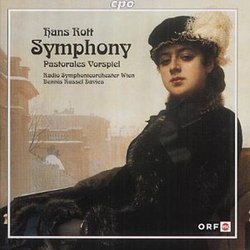| All Artists: Hans Rott, Dennis Russell Davies, Radio Symphonieorchester Wien Title: Hans Rott: Symphony in E Major & Pastorales Vorspiel Members Wishing: 1 Total Copies: 0 Label: Cpo Records Original Release Date: 1/1/2002 Re-Release Date: 7/16/2002 Genre: Classical Style: Symphonies Number of Discs: 1 SwapaCD Credits: 1 UPC: 761203985425 |
Search - Hans Rott, Dennis Russell Davies, Radio Symphonieorchester Wien :: Hans Rott: Symphony in E Major & Pastorales Vorspiel
 | Hans Rott, Dennis Russell Davies, Radio Symphonieorchester Wien Hans Rott: Symphony in E Major & Pastorales Vorspiel Genre: Classical |
Larger Image |
CD Details |
CD ReviewsWhat a masterpiece. Paul Grainger | Hassall Grove, New South Wales Australia | 08/24/2003 (5 out of 5 stars) "I must thank the first reviewer for tempting me to buy this. What a truelly superb work. The sheer majesty of this work and Rott's truelly unbelievable command of the forces of the Symphony orchestra make this one of the great symphonic experiences.THe Orchestra and conductor play both works with the great skill and feeling.Again many thanks for putting me onto this truelly great symphony. THe only sadness was for a career truelly cut far too short. If he had lived Hans Rott would be amongst the immortals of classical music." Hans Rott: Past Regained Christopher Lovett | MA United States | 03/10/2004 (4 out of 5 stars) "After a long familiarity with the music of Mahler, discovering the Hans Rott Symphony in E is less like a conscious reach into memory than an unforeseen flashback. For all its evocations and anticipations, and inspite of some formative shortcomings, this is music with its own personality, in a way comparable to Mahler's formative cantata, "Das Klagende Lied." As a work of daring and originality in its own right (if not necessarily a masterpiece), the symphony is definitely enjoyable, especially in passages where Rott is least connected to predecessors or Mahler-to-come. If there was a reason for Mahler to consider Rott the "father of the modern symphony," it may have been how he pushed at the edge of the distinction between the composer's music and the "musique concrete" of the world--especially noticeable in the scherzo. Rather than seemlessly synthesize these different worlds as Brahms did, Rott and Mahler leave the inconsistencies exposed, even highlighted. I suspect this is the main principle of inclusiveness Mahler had in mind when he said a symphony must be "like the world." Many commentators have found passages in Rott that anticipate Mahler, but the notes by Eckhardt van den Hoogen also fill in a missing biographical link. It is well known that Mahler saw a score of the Rott symphony around 1900. The notes for the recording point out that Mahler had also performed a version of the work on piano in the early 1880's. That's early enough to influence Mahler's 1st Symphony, and maybe even early enough for this favorite people to influence--in a more subtle way--the E Major Symphony of his teacher, Anton Bruckner. More interesting than pinpointing where Rott sounds like Mahler is defining the affinity between the two, which has a good deal to do with pushing at boundaries. It's easy enough to hear the resemblance between part of Rott's long finale and the long finale in Mahler's 2nd Symphony--music seemingly perched on the edge of another world. Even more interesting is how the void practically emptied of music (just before the "Aufersteh'n" chorus) re-emerges in late Mahler, especially in the twilight recitativ before a glowing arioso section of "Der Abschied." This isn't a matter of quotation, but about what's under a composer's skin, something that extends from first works to the last. Listening to Rott also sheds a light on what makes Mahler different. Mahler supposedly complained about how much his composing suffered (at least quantitatively) because of all the time he spent conducting, especially conducting opera. But that time might also have enriched his sense of the dramatic, lyrical and comic elements that are common to opera and instrumental music (as with another of Mahler's idols, Mozart). Even listening to Mahler's 1st Symphony after Rott shows how the more famous composer was more comfortable with the dynamics of drama, as if he had been through the drill many times before as a conductor. With only fragmentary exposure to other recordings, I would have to say the strongest competition for the Davies performance would be the BIS recording with Leif Segerstam. Davies's orchestra has an edge over the players on the commonly available (in US) Hyperion reissue, though the inclusion of Rott's earlier "Pastorales Vorspiel" might be a bit of a come-down from the symphony." The New Symphony Kushal Dasgupta | Kolkata, India | 02/03/2007 (5 out of 5 stars) "Till a couple of months back if anyone would have asked me who Hans Rott is I would'nt have had the slightest idea. It was through a Radio broadcast that I first came across the legendary work (a 1st work of a composer at age 20)& I must say it only took listening to the first few bars to realize that you are in presence of a master. The musik kept haunting me for days & I had to dig the internet to get info about Rott & his early tragic & premature death. This is the the only recording of the Symphony I have & I must say that the RSO Vienna has done a good job. One would easily trace influnces of Mahler (whoes compositions were composed much later than Rott) Bruckner, Wagner, Schumann & Brahms himself (Who was partially responsible for Rott's tragic end). A must for all who love Romantic musik & music in general. A symphony that needs to be heard & made known to the wide public."
|
